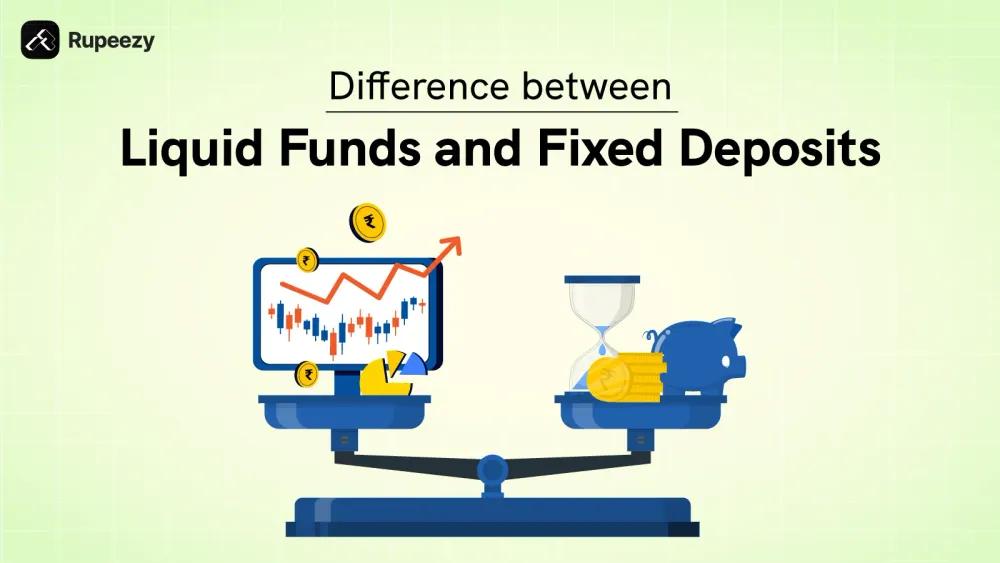Liquid Funds vs FD: Which Investment Option Suits You Best?


00:00 / 00:00
When it comes to short-term investments, the choice between Liquid Funds and Fixed Deposits (FDs) raises common confusion among investors. This is because they need a guarantee of safety and returns. Both investment options have their own advantages and disadvantages. Which is why it is important to understand their key differences before making a decision.
In this article we will explore the details of liquid funds vs FDs, listing their features, benefits, how they work and tax implications. If you're an investor looking for better returns with liquidity, understanding these differences will help you make an informed choice. Read on!!!
Overview of Liquid Funds
Definition
Liquid funds are a type of mutual fund that primarily invests in short-term market instruments, such as treasury bills, commercial papers, and certificates of deposit, with maturities typically not exceeding 91 days. They are categorized under debt mutual funds and are designed to offer high liquidity with reduced risk. This makes them an attractive option for investors looking to easily convert their investment into cash when needed.
How Liquid Funds Work?
Liquid funds work by gathering money from different investors to invest in a diversified portfolio of high-quality debt securities. The primary goal is to provide capital preservation while generating modest returns. Another is to ensure that the investment is secure and that investors can access their money quickly, and the proceeds are generally credited to their account within one business day. The Net Asset Value (NAV) of a liquid fund is updated daily, reflecting the value of the underlying assets. The short maturity period of the underlying instruments ensures that the interest rate risk and NAV fluctuation is minimal.
Key Features
1. Low Risk: Liquid funds invest in high-quality, low-risk securities, typically rated AAA. This high credit quality instrument has a very short maturity, reducing the risk of default or loss.
2. High Liquidity: Liquid funds provide almost instant liquidity. Investors can redeem their investment proceeds quickly, often within 24 business hours, making these funds ideal for emergency funds or short-term needs.
3. Low Returns Volatility: The short maturity of the underlying assets means that liquid funds experience minimal volatility in returns, making them stable and predictable. Liquid funds generally offer returns ranging from 4% to 7% p.a., which is higher than traditional savings accounts.
4. Tax Applicability: Previously, liquid funds were taxed based on capital gains rules, with indexation benefits available for holdings longer than three years. However, as per the July Budget 2024, indexation benefits on debt mutual funds, including liquid funds, have been removed. Now, gains from these funds are taxed at the individual's income tax slab rate, regardless of the holding period.
Benefits of Liquid Funds
1. Capital Preservation: Liquid funds are designed to preserve capital, making them an ideal investment option for risk-averse investors or those looking to park their surplus funds temporarily.
2. Better Returns than Savings Accounts: Typically, liquid funds offer slightly higher returns compared to traditional savings accounts, making them an attractive alternative for short-term cash management.
3. Ease of Access: The high liquidity of these funds ensures that investors can quickly access their money when needed, without worrying about significant penalties or loss of returns.
4. Diversification: Liquid funds diversify their investments across a wide range of short-term instruments, reducing the impact of a potential default or interest rate hike on the overall portfolio.
5. Suitable for Short-term Goals: Whether it’s saving for an upcoming expense or managing cash flows for a business, liquid funds provide a flexible, low-risk investment option that aligns well with short-term financial goals.
Overview of Fixed Deposit
Definition
A Fixed Deposit (FD), also known as a term deposit or time deposit, is a financial instrument provided by banks and non-banking financial companies (NBFCs) that lets individuals deposit a lump sum of money for a fixed period at a predetermined interest rate. The deposited funds are locked in for the chosen tenure, which can run from a minimum of 7 days to a maximum of 10 years, depending on the bank's policies.
How Does a Fixed Deposit Work?
To open a fixed deposit, you need to provide the bank with a certain amount of money and specify the period for which you want to invest. The bank then locks in your funds and pays you a fixed interest rate throughout the tenure, regardless of market fluctuations. During this tenure, the deposited amount earns interest, which is compounded periodically. The interest rate for FDs is typically higher than that of a regular savings account and is determined by the duration of the deposit, the financial institution, and prevailing market conditions. Once the FD matures, the principal amount along with the accumulated interest is returned to the depositor. The interest can be paid out periodically (monthly, quarterly, or annually) or compounded and paid at maturity, depending on your preference.
Key Features
1. Fixed Interest Rate: The interest rate is fixed at the time of deposit and does not change during the tenure, providing certainty and stability in returns.
2. Fixed Tenure: The duration of an FD is predetermined and can range from a few days to several years. The longer the tenure, the higher the interest rate typically offered.
3. Loan Against FD: Many banks offer loans against FDs, allowing depositors to borrow up to 90% of the FD’s value without breaking the deposit. The interest rate on such loans is generally lower than personal loans.
4. Tax Benefits: Certain types of FDs, such as tax-saving fixed deposits, offer tax deductions under Section 80C of the Income Tax Act, up to a limit of ?1.5 lakhs per annum.
5. Premature Withdrawal: Although FDs are meant to be held until maturity, most banks allow premature withdrawal, however, with a penalty that usually involves a reduced interest rate or a flat fee.
Benefits of Fixed Deposits
1. Low Risk: FDs are considered one of the safest investment options, especially in a stable banking environment. This is because they are not subject to market fluctuations. The returns are guaranteed, making it an ideal choice for risk-averse investors.
2. Capital and Wealth Preservation: FDs help in preserving the principal amount and you are guaranteed to receive the initial investment back along with the interest at maturity. It preserves wealth by providing returns that typically outpace inflation because the purchasing power of the invested amount remains intact over time.
3. Stable Returns: Since the interest rate is fixed, the returns are predictable, allowing investors to plan their finances with greater certainty.
4. Perfect for Short term Goals: Fixed deposits are ideal for gaining short to medium-term financial goals and plans. This includes; purchasing a car, paying for education, or planning a vacation.
5. Regular Income Stream: Fixed deposits can be another source of steady income. This works best especially for retirees and this is because the interest can be paid out in specific periods. It could be yearly, monthly or quarterly.
Difference between Liquid Funds and Fixed Deposit
Subject | Liquid Funds | Fixed Deposit |
Investment type | Debt mutual funds investing in short-term instruments | Bank deposits with fixed interest rates |
Risk level | Low risk only affected by change in interest rates | Extremely low risk; insured up to ?5 lakh |
Returns | Slightly variable; generally around the rate of FDs | Fixed; usually equal to liquid funds, but guarantees return. |
Liquidity | High; can be redeemed anytime after 7 days without penalty | Moderate; premature withdrawal incurs penalties |
Investment term | Short-term (up to 91 days) | Medium to long term (7 days to 10 years) |
Entry/ Exit Load | No entry load/exit load applied if redeemed within 7 days | No entry/exit load; penalties apply for early withdrawal |
Ideal for | Short-term parking of surplus funds | Long-term savings and guaranteed returns |
Interest payment | No regular payouts; capital gains upon redemption | Regular payouts available(monthly, quarterly or yearly) |
Taxation | Taxed as per income slab; higher for short-term gains | Taxed as income; applicable on interest |
When to Choose Liquid Funds Over Fixed Deposits?
Is liquid fund better than FD? When deciding between liquid funds and fixed deposits (FDs), it's important to consider your investment horizon, risk tolerance, and liquidity needs. Liquid funds are better for short-term goals or parking surplus cash, as they provide almost equal returns to fixed deposits while providing better liquidity. Compared to FDs which charge a premature withdrawal penalty, liquid funds are easier to access through quick withdrawals. If you need your money soon and want equal returns, with better liquidity liquid funds are a better option.
When to Choose Fixed Deposits Over Liquid Funds?
Fixed deposits (FDs) are a better choice over liquid funds when you are a risk-averse investor looking for guaranteed returns and are willing to lock in your money for a longer period. FDs offer a fixed interest rate that remains unchanged throughout the tenure, providing predictable returns. They are ideal for long-term financial planning, such as retirement savings. Additionally, if you are in a lower tax bracket and prefer the certainty of returns, FDs can be more advantageous. For example, an FD offering 10% returns in the 20% tax bracket would yield a post-tax return of 2%, which may be higher than the post-tax return from a liquid fund offering 4% returns in the same tax bracket.
Tax on Liquid Funds vs FD?
Taxation on liquid funds has changed as of the July 2024 Budget. Now, gains from liquid funds, irrespective of the holding period, are taxed at the investor's applicable income tax slab rate, and the indexation benefits have been removed. This aligns their tax treatment more closely with that of savings accounts and other fixed-income investments.
Similarly, Fixed Deposits (FDs) are subject to tax on the interest earned, which is added to the investor’s income and taxed at the applicable slab rate.
Therefore, tax on liquid funds vs fixed deposits is more efficient, particularly for investors in higher income tax slabs looking for short-term investments.
Conclusion
When considering investment options, understanding the differences between liquid mutual funds vs FD is important to help align your financial goals with your risk tolerance and liquidity needs. The ultimate choice between fixed deposit vs liquid funds depends on your individual preference for stability versus growth.
For expert guidance tailored to your investment needs, Rupeezy is here to help you make informed decisions that will help you optimize your financial strategy.
Check Out These Related Articles |
The content on this blog is for educational purposes only and should not be considered investment advice. While we strive for accuracy, some information may contain errors or delays in updates.
Mentions of stocks or investment products are solely for informational purposes and do not constitute recommendations. Investors should conduct their own research before making any decisions.
Investing in financial markets are subject to market risks, and past performance does not guarantee future results. It is advisable to consult a qualified financial professional, review official documents, and verify information independently before making investment decisions.

All Category









